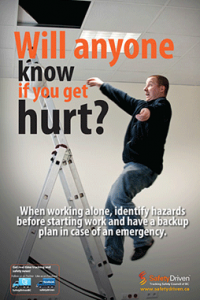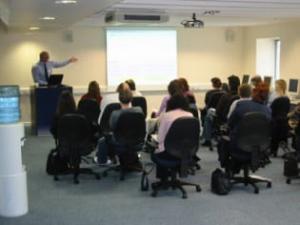‘Working Alone’ or ‘Lone Working’ means working in an area, or in circumstances, where there are no other workers present.
In the event of an emergency there is no one to give assistance or summon help.
Most RMWs are lone workers including, sales staff, service engineers, healthcare workers, probation officers and those who work outside normal office hours – security staff, cleaners and maintenance staff.
It is estimated that the mobile workforce will continue to grow in coming years.
Well known cases.
There are two well known cases where a RMW has died whilst at work:
- Estate agent Suzy Lamplugh disappeared in 1986 after she went to meet a client at an empty house. Her parents were keen that lessons should be learnt from the case to make it less likely that others would lose family members through poor management of lone working, setting up the Suzy Lamplugh Trust (http://www.suzylamplugh.org) to highlight the risks people face and to offer advice, action and support to minimise those risks.
- In 2004, a Scottish gamekeeper died after crashing his quad bike, however it took 52 hours for anyone to notice he was missing. Trustees admitted failing to provide a means of communication or carrying out a risk assessment for a lone worker to report in at the end of a shift. Also he was not provided with a mobile phone to call for help. The estate he worked for was fined £3,000.
Health and well being of RMWs
The risks to physical safety faced by RMWs particularly verbal and physical assaults in the case of public-facing roles, have long been recognised. In studies almost two-thirds of RMWs report psychological distress, neck, shoulder, lower back pain and poor mental health linked to:
- longer working hours
- higher customer numbers
- high psychological demands
- low decision authority
- lack of role clarity
- role conflicts.
Driving (both high mileage and long hours) is linked to lower back, neck and shoulder symptoms. An adjustable lumbar support and adjustable steering wheel can reduce sickness absences due to musculoskeletal pain.It is estimated that just under half of RMWs suffer road rage, at least once a year and 11% are assaulted
Legal duties
So, what are your legal duties as an employer? Well as a responsible employer you are required to ensure that ALL of your employees have a safe place to work. That you have considered the risks that they may be exposed to and provided the safe controls?
There are pieces of legislation in place that apply and that you should consider as part of your safe systems
The main areas of health and safety law relevant to RMWs are:
- The Health and Safety at Work etc Act 1974 (HSWA)
- The Management of Health and Safety at Work Regulations (MHSWR) 1999
- The Display Screen Equipment Regulations 1992 (as amended)
- The Manual Handling Operations Regulations 1992
- The Provision and Use of Work Equipment Regulations (PUWER) 1998
- The Control of Substances Hazardous to Health Regulations (COSHH) 2002 as amended
- The Electricity at Work Regulations 1989
- The Confined Spaces Regulations 1997.
So some of the actions to protect RMWs
- plan journeys to minimise the miles driven
- build in time for rest breaks; every two to three hours of driving time
- ensure decision-making levels of authority are clear
- foster a supportive management style
- encourage physical fitness to help reduce chronic fatigue
- ensure there is a clear policy on restricting the use of mobile phones, particularly hand-held phones whilst driving.
Recommendations for employers:
There are a number of things that we recommend employers consider so as to reduce the risks of their workers who work on the road and/or alone.
- conduct risk assessments for those activities that involve remote or mobile working: – What are the risks to these workers, what is the likelihood of something going wrong and what can be done to reduce this risk?
- design and implement policies and procedures to protect those who work alone. – This could be as simple as having them call in at agreed times to ensure they are ok
- monitor working procedures to ensure safety
- consult with employees and/or their representatives about policy – They know the risks they are exposed to better than most are could have sensible ways to reduce them
- compile and maintain a database of locations/persons that should not be visited by just one worker. – Do you have potentially more dangerous sites and/or customers that need to be visited, so requiring two or more members of staff?
- provide information, instruction, training and supervision for workers – Once you have carried out your risk assessment tell the relevant workers about your findings.
- issue workers with necessary communication equipment (eg personal alarms, mobile phones, walkie-talkies, personal GPS) and ensure that appropriate training is given in their use
- record the location of workers, via an automated system, diary, white board or personal GPS
- require workers to regularly report to their office base or to a co-worker
- provide workers with appropriate training, eg aggression management, assertiveness and negotiation as relevant to their work – You need to be sure that your employee is suitably trained for the situation they may find themselves in.
- ascertain the medical history/fitness of potential workers if activities are likely to impose extra demands on physical or mental stamina. Are you sure, for example, that the person you are sending into a dusty atmosphere doesn’t suffer from asthma?
- eliminate cash handling as far as is reasonably practicable. If one of your employees regularly takes the days/weeks takings down to the bank they are potentially at risk of being mugged. I note this week that a chain of Pubs in London now no longer accept cash as payment, only cards, so as to prevent such a risk.
- ensure the workplace and workstations are suitable (sufficient lighting, ventilation and heating, means of access and egress, fire precautions).
Protecting your Remote and Mobile Workers is important but not as difficult as you may think
If you would like any further help or support, please please contact us by phone 01458 253682 Email [email protected] or via our Facebook page or by Twitter
Taunton & Somerset CPD Group at The Exchange House Taunton
Please remember that we now run these CPD events at the Exchange House, 12 – 14 The Crescent, Taunton TA1 4EB on a fortnightly basis.
As previously requested, if you could let us know whether or not you can attend it would be greatly appreciated. Also, if you would like to give a talk, or know of somebody who would, please contact Jon at [email protected]
These CPD talks have now ended for 2018 with the next being in January 2019
Our next Seminar will be on Wednesday 16th January 2019. Could you please arrive by 12:30pm prompt.
Our speaker for this one is Anh Nguyen of Carlisle Construction Materials will talk about The art of waterproofing
If you haven’t already booked your place, or if you are not on the CPD Seminar mailing list but would like to be please drop Jon an email and he will deal with your request.
As per our last one if you could let Jon know whether or not you can attend within 7 days of receipt of his email, it would be greatly appreciated.
Contact Details: [email protected] 07831 714199 or 01458 253682
Training Courses
Under the Health & Safety at Work Act 1974 all relevant associated legislation, companies have a duty to train all their employees in health and safety matters.
THE WILKINS SAFETY GROUP are professional health & safety trainers.
As part of our services we provide a full range of Health & Safety courses at The Taunton Racecourse in Somerset which provide the latest in training facilities including multimedia projectors and large screen videos. They also provide delegates with a relaxed environment in which to learn, excellent food and ample car parking.
Alternatively, we can run most courses at your premises or another venue in your area, to suit your requirements.
How do we teach?
Our training style is informal and interactive, with use of syndicate work, case studies, discussion sessions and role-play. Videos are often used to enhance points being raised.
We believe that delegates gain the most from a course when they are relaxed, and our trainers and staff endeavour to ensure that this is made possible.
The next batch of courses will be in 2019
But remember we are still available for running “In House” courses and are looking to add new training courses to our list.
If you have any questions about these courses or any other training or would like us to run a particular course for you, call Jon Wilkins of the Wilkins Safety Group on 01458 253682 or email him at [email protected]
